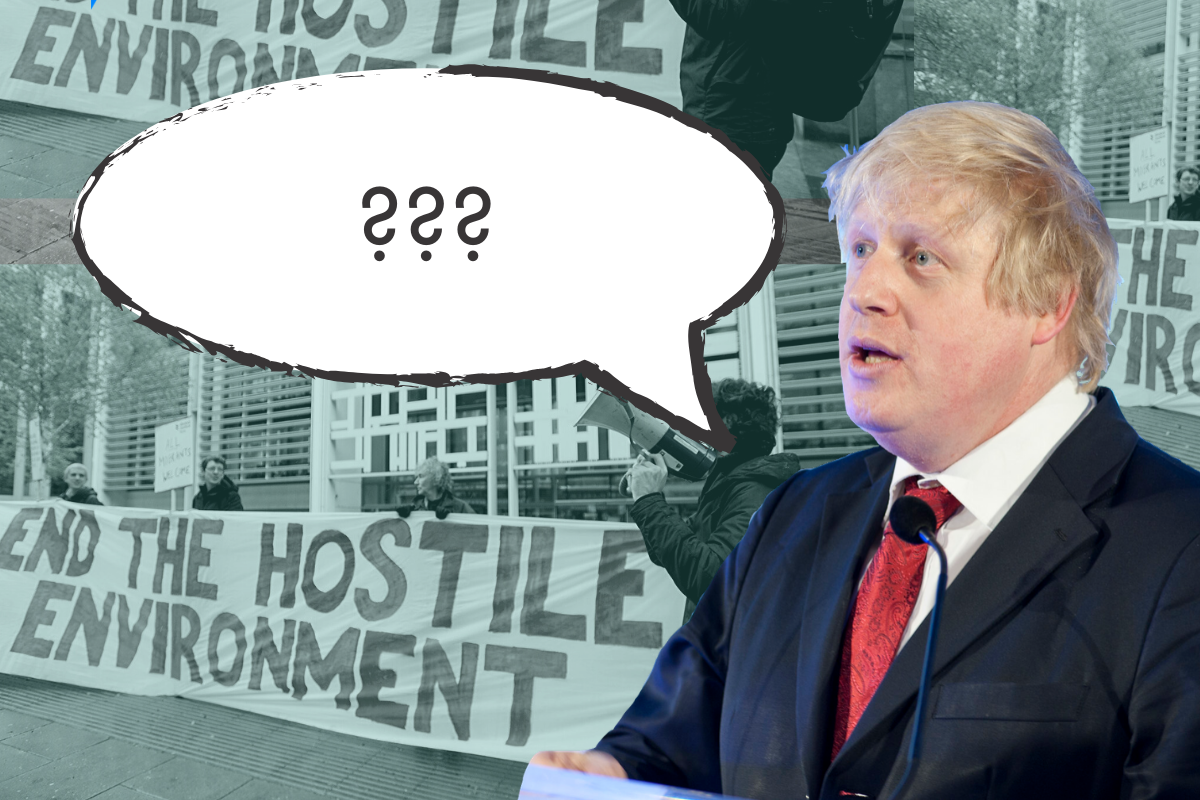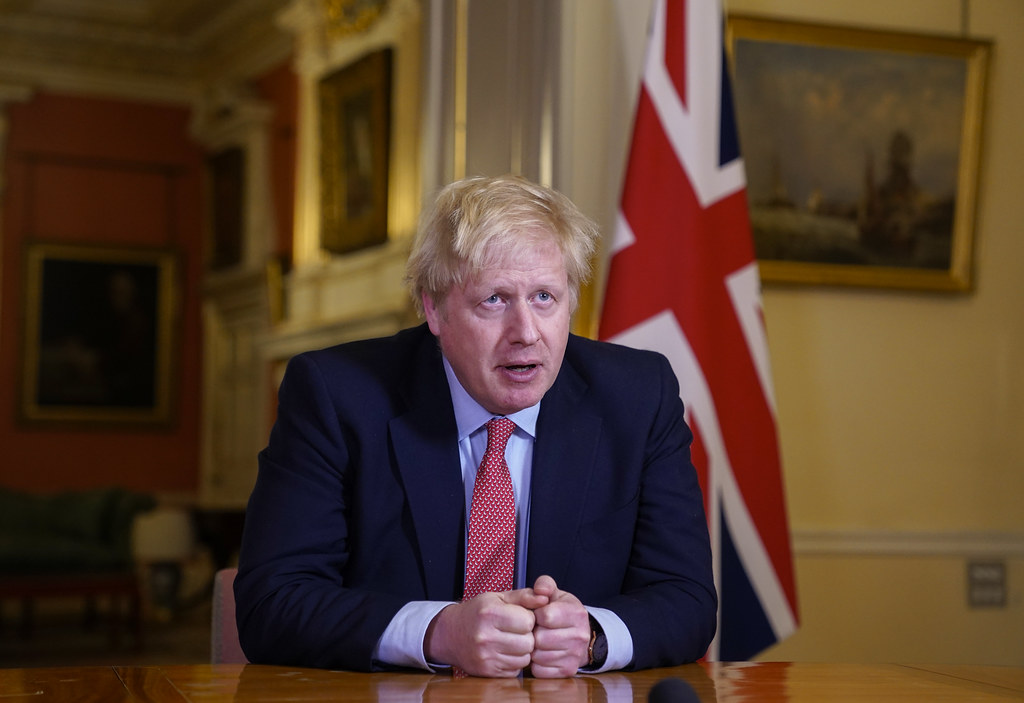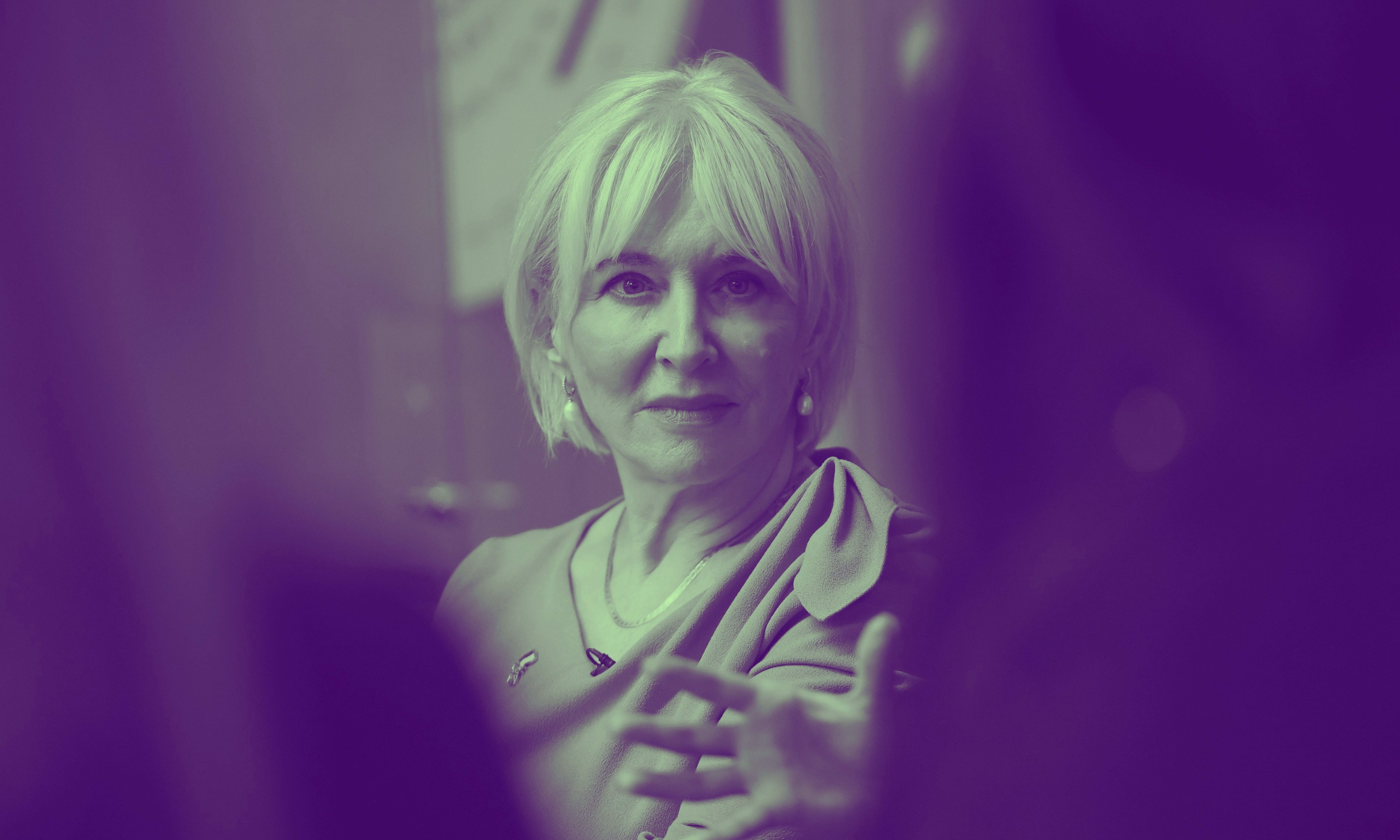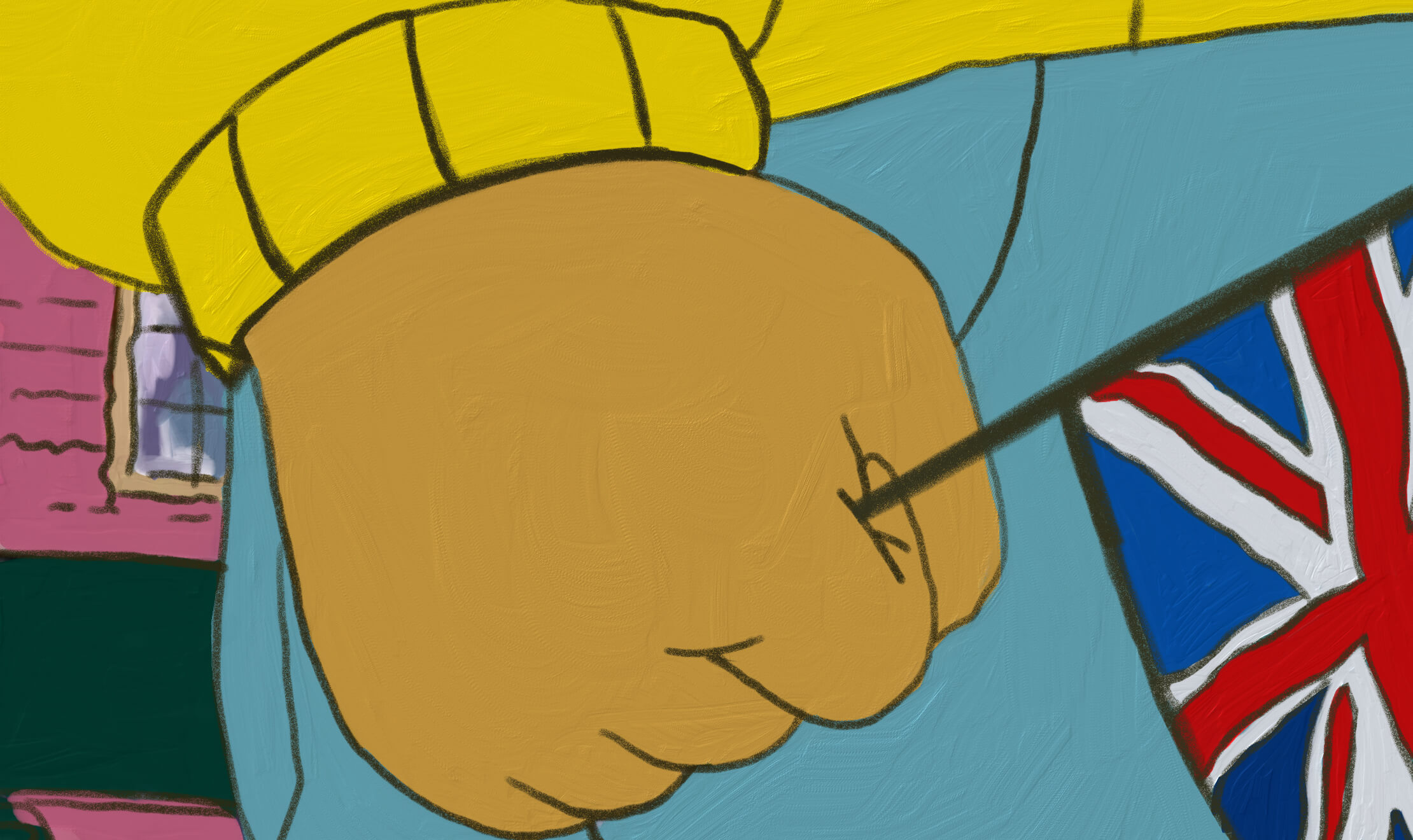
Image via flickr/Global Justice Now/Wikimedia Commons/Sophie Brown/the Financial Times
Boris Johnson, the Oxford graduate currently completing a funded residency at Number 10 Downing Street, has got into hot water again for speaking aloud some of the most brazen and harmful statements in the public domain: by which we of course mean the Conservative party manifesto pledges.
Yesterday, Boris visited a factory in Matlock in Derbyshire, a town which was recently affected by severe flooding and also found itself hosting the prime minister’s bungled attempt to mop up flood water in a local Specsavers. In a subtitled video of yesterday’s speech released by Channel 4, the prime minister appears to say: “controlling our immigration system, for the first time in decades, and that would be a good thing. I’m in favour of [people of colour] coming to this country but I think we should have it democratically controlled, and have it done that way”. Channel 4 subsequently stated their subtitling was incorrect and that Boris had actually said “people of talent” and not “people of colour”, and took down the video.
In spite of this correction, naturally and as is appropriate, a furore erupted with people commenting on Twitter that Boris’ “mask has slipped”, and that this alleged Freudian slip has revealed his true opinion. In reality, it doesn’t matter what Boris actually said. We already know the Conservatives have been controlling, and will continue to control people of colour coming to the UK. We also know that if re-elected next week, a Conservative government would intensify the hostile environment which seeks to make life untenable in this country for our communities, whether we identify as “migrants” or believe we are subject to immigration control, or not.
Let’s not get it twisted: the concept of “British-ness” is deeply entangled with whiteness, which means that citizenship cannot protect us from the actions of the state. From the case of Shamima Begum (who had her citizenship revoked) and the Windrush scandal, to the incessant stop and search practices used against predominantly young black men, and the women of colour fighting their incarceration in Bedford’s Yarl’s Wood, it is evident that as people of colour our right to reside or even just go about our business peacefully is constantly in flux. When the government talks about “migrants” and controlling immigration, history shows that they actually mean limiting the freedoms of anyone who isn’t white.
Two initial questions emerge from the contested sentence in Boris’ speech. Firstly if he had said that he wants to specifically control immigration of “people of colour” with his full chest, would this have told us anything new about his party’s policy approach? I’d argue that it wouldn’t. What it would have done (and might still do) is mark a further shift in all-out racist political discourse another huge notch to the far-right, which as we saw in the 123% spike in hate crime after the xenophobic rhetoric of Brexit debates, has real-life consequences. At the same time, Boris is a person who has called black people “piccaninnies” with “watermelon smiles” and compared Muslim women to “bank-robbers” and “letterboxes” among other statements which are detailed in our comprehensive digest of everything awful Boris has said on record. Expressing overt contempt for people of colour and disdain for our presence in the UK is business as usual for the current prime minister, not a slip of the mask.
Secondly, to what extent is the phrase “people of talent” – if that’s what Boris said – much less troubling? A quick browse through Hansard -–the online version of what I imagine to be a huge leatherbound book which documents everything said in parliament since 1909 – shows that “people of talent” has only been said 33 times in the House of Commons. Meanwhile, the word “blancmange” has been said 50 times according to Hansard, suggesting both an absurd parliamentary obsession with gelatinous desserts, but also that Boris is really trying to make the burgeoning phrase “people of talent” happen in 2019.
The first utterance of “people of talent” fell from the lips of a colonial civil servant in 1911 during a discussion, aptly, about Oxbridge graduates being treated preferentially when applying for jobs, irrespective of their actual “talent”. Fast forward to 1988, and in a discussion about the need for democracy and subsequent uncertain atmosphere in Hong Kong, Liberal MP Sir Russell Johnston raises concerns that “people of talent” wishing to come to the UK from Hong Kong are being blocked. This is noteworthy because the phrase “people of talent” takes on specific meaning considering Britain’s colonial history. “People of talent” is the government’s attempt to wash its hands of its obligations to the people living in and rebuilding the 90% of the world that Britain has at some point invaded or colonised. Only opening your doors to what you define as “people of talent” is about asserting a belief that you should get first pick when choosing players in a game that is so rigged and stacked in your favour that it’s practically impossible to win on any other team.
1988 was an important year for the origin story of Hong Kong’s pro-democracy movement. As Lily Kuo details for Quartz, in 1986 (two years before the House of Commons “people of talent” discussion) a 1,000-person strong protest in a Hong Kong theatre demanded direct elections, which were finally held in September 1988. However, that same year, plans to hold elections for the Chief Executive were pushed back to 2012, sparking hunger strikes and blocked attempts to deliver a petition with 60,000 signatures to Beijing. In short: the phrase “people of talent”, as deployed by Sir Russell Johnston, describes people attempting to leave an unstable political climate, where democracy had not been encouraged by the UK because, as a Conservative MP says during the same debate, democracy is “not necessarily as efficient as a benevolent dictatorship”.
“Boris didn’t need to say “people of colour” because he has already been explicit about who can come to the country, or call themselves British”
Russell’s question about people from Hong Kong being blocked from coming to the UK shows the trickery in Boris’ speech yesterday: the category “people of talent” is vague and open to interpretation depending on what is convenient for the government. Even those within the category can still be blocked from arrival if Britain doesn’t feel an obligation to accept them. Boris didn’t need to say “people of colour” because he has already been explicit about who can come to the country, or call themselves British. Boris has plainly stated what he perceives to be a “cultural difference” between himself and, for example, British Muslim women, while welcoming with open arms Australians living 9,500 miles away – who themselves have marginalised indigenous communities and occupied their lands – who he has said are “just like us”.
A slightly less notable use of the phrase was delivered by Conservative MP David Davis, who, in a 2009 Commons discussion, raised concerns that an increase to tax for high earners could deter “people of talent” from coming to the UK. More pertinently however, in a 2017 Commons debate about housing supply, in one easy breath the Conservative MP John Redwood attempts to pin the blame for the lack of housing on demand driven by both “refugees” and migrant communities, despite himself framing them as “people of talent”. Not only is the suggestion that refugees and “talented people” are mutually exclusive categories wildly offensive and inaccurate, but it also reveals that “people of talent” are at heart not really welcome either way, and will be held responsible for the Conservatives’ own disastrous welfare policies and inaction on the housing crisis.
“The most recent usage of “people of talent” was spoken by Boris at his first rodeo as prime minister in the House of Commons”
The most recent usage of “people of talent” was spoken by Boris at his first rodeo as prime minister in the House of Commons in July 2019. In a debate, Labour MP Stephen Timms asked the Prime Minister what action he would be taking to make amends for a spate of allegations of cheating on English language tests which led to 35,870 students having their visas refused or revoked. Boris replied: “I have a long-standing commitment to supporting the freedom of people of talent to come to this country. If [Stephen Timms MP] looks at my political record, I do not think, genuinely, that he will find anybody who has done more to champion the rights of immigrants to this city or to this country”. The usage by Boris of “people of talent” in this context – when defending his hostile environment policies – confirms the phrase as nothing more than a meaningless distraction in the face of tens of thousands of students in this example having their lives turned upside down.
We may never definitively know whether Boris said he wants to restrict the arrival of “people of talent” or “people of colour”, but almost a decade of Conservative hostile environment policies and election pledges to end freedom of movement means that neither group is included in the Tory party vision for Britain. Boris Johnson has already said enough, both on and off the record, and will not ascend from the gutters of Tory party prioritisation of profit over people by straightening the record on this one phrase.
gal-dem is backing the Labour party this election. Jeremy Corbyn’s pledge to scrap the 2014 Immigration Act which kick-started the hostile environment is the best starting point on offer for continued resistance against immigration controls which target, surveil and lacerate our communities. The construction of Britishness is tightly bound to whiteness, meaning that the Conservatives’ sustained attack against migrant communities is an attack against us all. The words no longer matter – Boris’s actions past and present speak louder than any bungled sentence.









